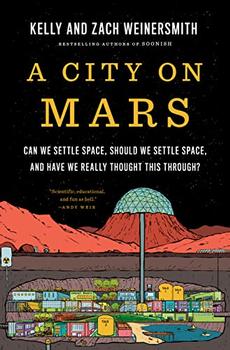Summary | Excerpt | Reviews | Beyond the Book | Readalikes | Genres & Themes | Author Bio

Can We Settle Space, Should We Settle Space, and Have We Really Thought This Through?
by Kelly Weinersmith, Zach Weinersmith
The territory argument is the most silly. Nations don't fight over land, they fight over particular land. You can't solve disputes over Jerusalem or Kashmir or Crimea by promising the parties involved equally large stretches of Antarctica. It'd be like going to a nasty divorce proceeding and trying to solve the custody fight by offering to just grab some other kids. Also, if we're defining land as "built structures humans live in," which is the definition you must use for space habitats, well then, on Earth we are creating land all the time. Individual buildings create far more square footage than any space settlement likely to be built anytime soon. Meanwhile, if you personally just want any sort of land there's plenty. Google it. Small towns all over the developed world are offering free land to people willing to move there instead of big cities.
The argument about riches may sound tempting; if humans are rich, why would we fight? But the "money makes us all friends" argument isn't one that all war scholars buy. Wars start for all sorts of reasons that have nothing to do with a bunch of people looking at their resource base and saying "hey, this is pretty good." A nonexhaustive list of causes of war includes: religious differences, leaders who don't bear the cost of the violence, and misperception about the other party's strengths or intentions. Even if space activity left everyone better off, it wouldn't stop nations from having religious differences, bad leaders, or suspicion about rivals.
As for peace through allowing people to just move between settlements, well, we should consider that most people aren't even allowed to do this between nations on Earth. Space will likely be worse. However you feel about immigrants coming to your country, one thing you probably don't fear is the possibility that they'll breathe too much air. In space, the atmosphere is constructed, as is the ground beneath your feet, and individual settlements will only be rated for certain population sizes. That's not obviously an environment where you'd expect to see open borders. Some advocates note that you can always just create a new place to live in space, but then the argument becomes "you can just pull up stakes by creating a million-ton space station," which, we suspect, will not be a live option for most of us. Even if it were, it's still not clearly desirable. Dr. De Witt Kilgore, one of the few historiographers of ideas about space, called it a form of celestial "white flight." That is, space not as a solution to politics, but as an escape from political realities one group finds uncomfortable.
Weinersmith Verdict: Nope.
Argument 5: Space Exploration Is a Natural Human Urge
This is a popular one. The basic idea is that yeah, maybe there's not a good return-on-investment reason for space exploration, but if we don't do it, we'll be thwarting our own nature, resulting in widespread human stagnation. The prettiest version of this argument is of course from Dr. Carl Sagan: "For all its material advantages, the sedentary life has left us edgy, unfulfilled. Even after 400 generations in villages and cities, we haven't forgotten. The open road still softly calls, like a nearly forgotten song of childhood." It's a nice idea, and much better written than any of our Uranus jokes. Also, it can be hard to argue against views like these because it's not always clear what the exact claim is. However, when people do get specific, they tend to point to two things: famous human explorers, and the fact that humans have spread around the world.
Excerpted from A City on Mars by Kelly Weinersmith and Zach Weinersmith. Copyright © 2023 by Kelly Weinersmith and Zach Weinersmith. Excerpted by permission of Penguin Press. All rights reserved. No part of this excerpt may be reproduced or reprinted without permission in writing from the publisher.
Your guide toexceptional books
BookBrowse seeks out and recommends the best in contemporary fiction and nonfiction—books that not only engage and entertain but also deepen our understanding of ourselves and the world around us.